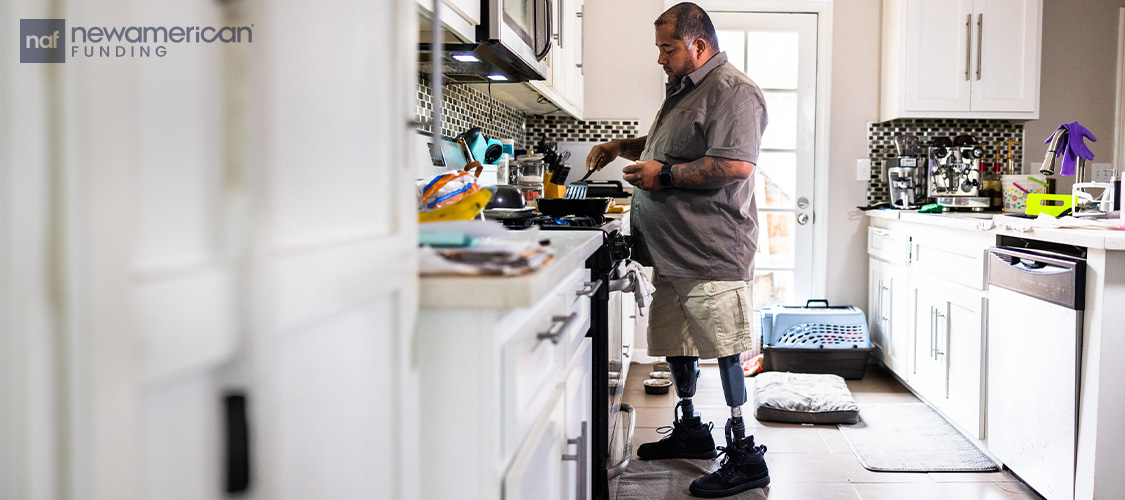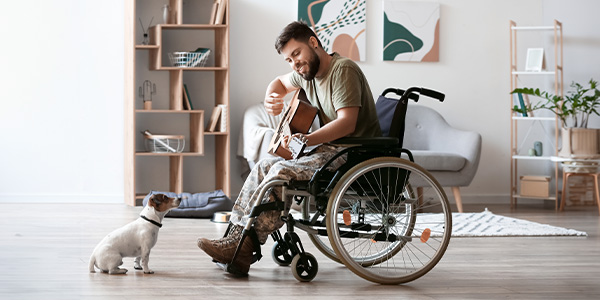Homebuyers
Buying a Home as a Disabled Veteran: What you Need to Know
November 11, 2024
If you’re a Veteran trying to acclimate to civilian life, you know it’s not always easy. The struggle to find a home can be particularly challenging, especially if you are disabled.
Disabled Veterans face a lot of challenges that can affect their homebuying journey, including higher rates of unemployment, increased chances of experiencing homelessness, and mental and physical impairments that can make daily life difficult to manage, according to experts.
There were 5.27 million Veterans with service-related disabilities as of August 2023, according to the U.S. Department of Labor.
Despite the many challenges, it is still possible for a disabled Veteran to buy their own home. The U.S. Department of Veterans Affairs (VA) offers housing benefits to Veterans with service-connected disabilities including VA loans, housing grants, and employment assistance.
“Please don't get so discouraged that you don't try again. Because it's great that you served your country and it's an honor to be able to serve you back,” said New American Funding (NAF) loan officer Leslie Bergen, who is based in El Paso, Texas.
Advocating for yourself as a disabled Veteran
Often, disabled Veterans become discouraged by the lending process, according to Bergen.
They may believe because their credit score is too low, they have been turned down from another lender, or know someone who was denied, and believe that they won’t be able to use a VA loan to get a home.
“The number one thing, especially with VA [loans], is to stop putting yourself in a box and thinking…that you don't have a hope of using your VA loan to buy a home,” said Bergen.
It may take a while to start getting your disability payments. In the meantime, your credit may be damaged.
However, when looking at VA loan approval, the reason why you may have a lower credit score matters, especially since VA loans have no minimum score requirement.
“A lot of people just get stuck and think, well, now I have to wait two years until my credit is all better before I can move forward,” said Bergen. “That’s not true. VA cares about the story, about what is happening, and is it a circumstance that is now fixed.”
VA loans, grants, and benefits for disabled Veterans
A VA loan is a Veteran benefit that is available to Veterans with or without a disability.
It is a type of home loan, insured by the government, that has no credit score minimums and doesn’t require Veterans to make a down payment. The loan application and approval process are the same for Veterans with disabilities and those without.
However, once you are declared legally disabled, you are eligible for various benefits depending on the percentage of your disability and the state you live in.
These can include an exemption from the VA funding fee, which is a one-time payment for the loan, as well as tax benefits, potentially discounted interest rates, and even financial compensation.
Disability compensation rates range from $171.23 to $4,211.74 monthly, depending on the disability and the dependents, for fiscal year 2024, according to the VA.
“Your disability is awarded by the government, and you have an award letter, and it tells you your percentage of disability,” said Bergen.
The VA also offers specific grants like the Specially Adapted Housing (SAH) and Special Home Adaptation (SHA) grants. These grants, which can be as much as $117,014 for SAH and $23,444 for SHA in fiscal year 2024, are designed to help Veterans buy or modify homes to suit their needs.

Advice for disabled Veterans trying to buy a home
The main things that disabled Veterans should focus on when trying to buy a home are choosing the right lender and ensuring they are purchasing a home that meets their needs.
Lender requirements can make or break a VA loan. While these mortgages may not require a minimum credit score, lenders may add their own criteria to borrowers. This may make it harder for a disabled Veteran to qualify for the loan.
You’ll also want to research the accessibility of the home and the community. Some things to keep in mind for those who are wheelchair bound are if the property has features like a wheelchair ramp, ground-level bedrooms, and cabinets and storage that are within reach.
Community support is also important. Is the property close to a VA hospital and other medical facilities? Are there mental health resources nearby? Is there reliable public transportation to help you navigate the area? These are all things that may affect your quality of life.
Making sure to interview your loan officer is also important. Some may be able to make the process easier for disabled Veterans by offering a remote close and using a virtual notary, if that is legal in your state.
“It's about the human that's on the other side of the transaction,” said Bergen.
Leslie Bergen (NMLS#383352)






 Smart Moves Start Here.
Smart Moves Start Here.